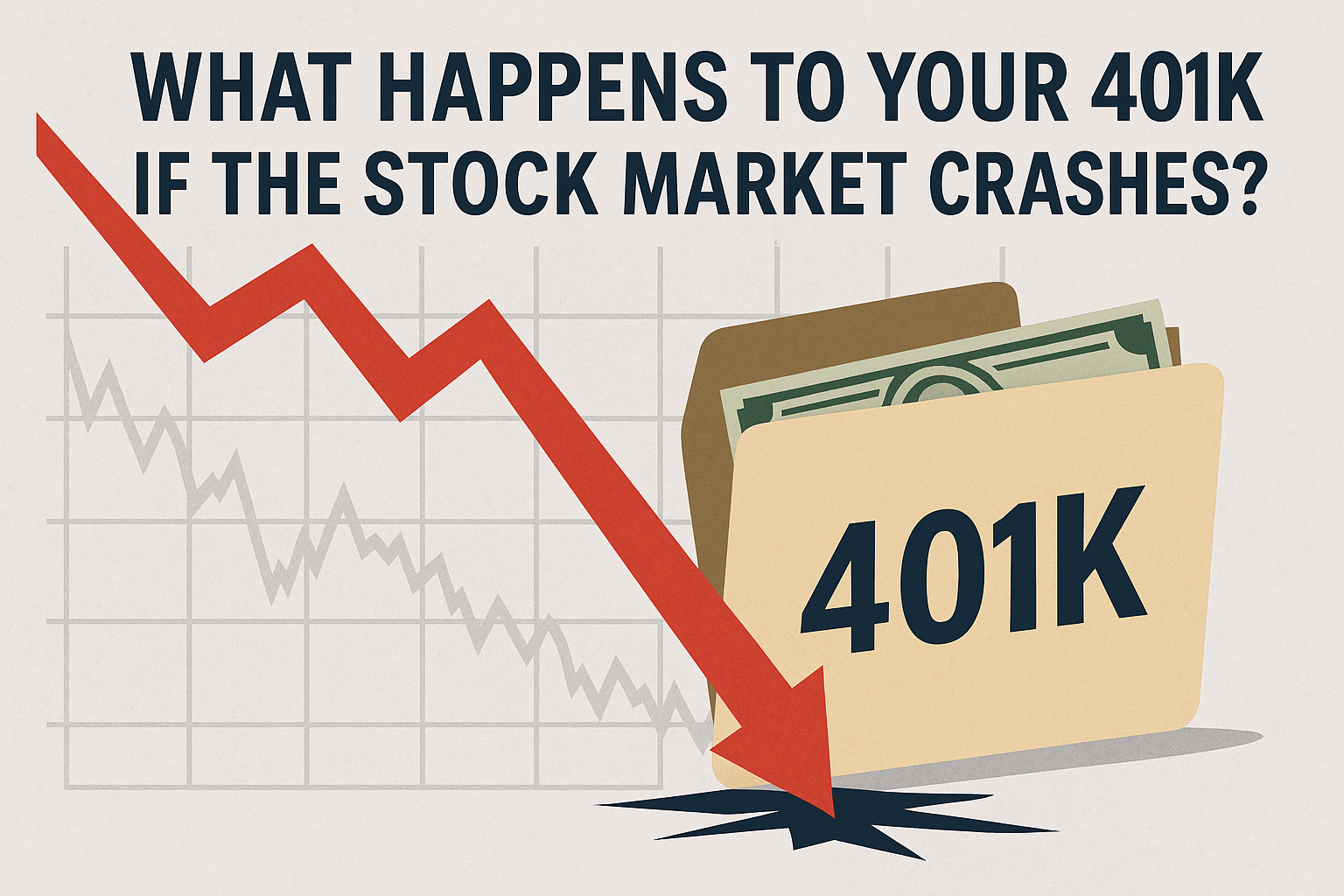I f you’re like millions of Americans with a 401(k), you’ve probably asked yourself a terrifying question: What happens to my 401(k) if the stock market crashes? It’s a valid concern. After all, your 401(k) is supposed to be your nest egg—a symbol of your retirement freedom. But what if the market takes a nosedive? Can your hard-earned savings survive?
This blog will walk you through exactly what happens to your 401(k) in a crash, real-life examples from previous downturns, strategies for protecting your assets, and why fixed index annuities are gaining popularity as a 401(k) rollover option.
What Happens in a Market Crash?
When the stock market crashes, the value of your investments—primarily stocks and mutual funds—can drop significantly. Since most 401(k)s are heavily tied to the market through these assets, a crash can slash your retirement savings.
Let’s break it down:
- Equities Lose Value: Your 401(k) holdings, often comprised of stock mutual funds or ETFs, lose value rapidly.
- Panic Selling: Many investors pull out of the market out of fear, locking in losses.
- Long-Term Impact: Unless your portfolio recovers or you’re years away from retirement, the crash can delay your retirement timeline.
The 2008 Financial Crisis
During the 2008 crisis, the S&P 500 lost approximately 38.5% of its value by year-end. According to the Employee Benefit Research Institute (EBRI), the average 401(k) balance fell 27% that year.
A 55-year-old with $300,000 in a 401(k) may have seen their balance drop to ▼$219,000.
If they were planning to retire within five years, many had to postpone retirement or reduce their standard of living.
It wasn’t until 2012 that most 401(k) accounts fully recovered. That’s four years of financial stress and uncertainty
Understanding Market Risk in Your 401(k)
Most 401(k) plans don’t guarantee principal protection. Unless you’re in a stable value fund, treasury bond fund, or money market account, your account is vulnerable to market volatility.
The IRS outlines 401(k) plan types in Publication 560, stating that your plan can offer a variety of investment choices, but it’s up to the participant to choose appropriately.
“You can allocate your deferrals to one or more investment options offered under the plan, and the investment risk lies with you.” – IRS Publication 560
How to Protect Your 401(k) in a Crash
You’re not powerless. Here are proven strategies to safeguard your nest egg:
1. Diversify Across Asset Classes
Avoid putting all your eggs in one basket. Mix stocks, bonds, cash, and potentially guaranteed products like annuities.
2. Reallocate As You Age
The closer you get to retirement, the more conservative your portfolio should be. Consider target-date funds or a custom glide path to reduce exposure.
3. Fixed Index Annuities (FIAs)
FIAs are becoming increasingly popular among retirees rolling over their 401(k). These products offer market-linked growth without exposure to losses. When the market goes up, your account grows. When the market goes down, you lose nothing—your principal is protected.
According to LIMRA Secure Retirement Institute, fixed index annuity sales hit $79.4 billion in 2023, a record high.
Rollover Strategy: From 401(k) to Annuity
If you’re 59½ or older or separated from service, you can roll your 401(k) into an IRA or annuity without penalty (per IRS rules). Doing so gives you access to protected retirement income strategies, including:
- Lifetime income riders (guaranteed income for life)
- Market downside protection
- Tax-deferred growth
This is 100% IRS-compliant under the direct rollover rules (IRS Notice 2001-57).
5 FAQs About 401(k) Crashes & Annuities
- Will I lose all my 401(k) money in a crash?
Not all of it, but a significant portion could be lost if your funds are tied to stocks and mutual funds. However, how much you lose depends on your asset allocation and age. - Can I move my 401(k) to safety before a crash?
Yes. You can reallocate to safer funds within your plan or consider an in-service withdrawal (if allowed) into a fixed index annuity for protection. - What is a fixed index annuity and why is it safe?
It’s a retirement product tied to a market index like the S&P 500—but it protects your principal from losses. You earn interest when the index goes up, and you earn zero (not negative) when the index goes down. - Is moving my 401(k) to an annuity tax-free?
Yes, if done as a direct rollover or trustee-to-trustee transfer, there are no taxes or penalties at the time of the transfer. - How can I know if an annuity is right for me?
Schedule a free consultation with a licensed annuity expert to review your goals, risk tolerance, and retirement timeline.
It’s Time to Think Proactively
Don’t wait until the market crashes to make a decision. If your 401(k) is your only plan for retirement, it’s time to diversify your risk. Fixed Index Annuities provide peace of mind, income for life, and principal protection in times of uncertainty.
With inflation, market volatility, and the unknowns of Social Security, you can’t afford to leave your retirement at risk. Whether you’re five years away or already retired, now is the time to review your 401(k) options.
📞 Want Help Reviewing Your 401(k)?
We’re here to guide you every step of the way.
✅ Call toll-free 1(800)568-9778
✅ Request a Quote: annuitynestegg.org/step1
Let’s protect your nest egg—before the next market crash.

